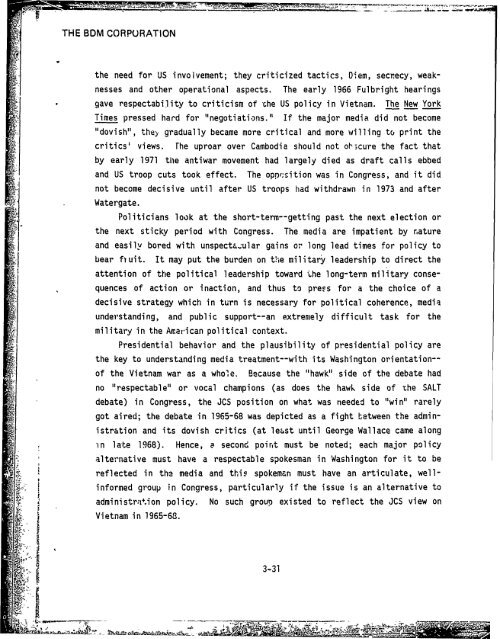policy - The Black Vault
policy - The Black Vault
policy - The Black Vault
Create successful ePaper yourself
Turn your PDF publications into a flip-book with our unique Google optimized e-Paper software.
77771,il~~~4..- I __-<br />
-- _- -I-I_<br />
THE BDM CORPORATION<br />
the need for US involvement; they criticized tactics, Diem, secrecy, weaknesses<br />
and other operational aspects. <strong>The</strong> early 1966 Fulbright hearings<br />
gave respectability to criticism of the US <strong>policy</strong> in Vietnam. <strong>The</strong> New York<br />
Times pressed hard for "negotiations." If the major media did not become<br />
"dovish", they gradually became more critical and more willing to print the<br />
critics' views.<br />
by early 1971<br />
rhe uproar over Cambodia should not oh;cure the fact that<br />
tiie antiwar movement had largely died as draft calls ebbed<br />
and US troop cuts took effect. <strong>The</strong> oppf:sition was in Congress, and it did<br />
not become decisive until after US<br />
troops had withdrawn in 1973 and after<br />
Watergate.<br />
Politicians look at the short-term--getting past the next election or<br />
the next sticky period with Congress.<br />
<strong>The</strong> media are impatient by nature<br />
and easily bored with unspecta.;ular gains or long lead times for <strong>policy</strong> to<br />
bear fiuit. It may put the burden on the military leadership to direct the<br />
attention of the political leadership toward the long-term military consequences<br />
of action or inaction, and thus to press for a the choice of a<br />
decisive strategy which in turn is necessary for political coherence, media<br />
understanding,<br />
and public support--an extremely difficult task for the<br />
military in the Amarican political context.<br />
Presidential behavior and the plausibility of presidential <strong>policy</strong> are<br />
the key to understanding media treatment--with its Washington orientation--<br />
of the Vietnam war as a whole. Because the "hawk" side of the debate had<br />
no 'respectable" or vocal champions (as does the hawk side of the SALT<br />
debate) in Congress, the JCS position on what was needed to "win" rarely<br />
got aired; the debate in 1965-68 was depicted as a fight between the administration<br />
and its dovish critics (at least until George Wallace came along<br />
in late 1968). Hence, a second point must be noted; each major <strong>policy</strong><br />
alternative must have a respectable spokesman in Washington for it to be<br />
reflected in the media and this spokeman must have an articulate, wellinformed<br />
group in Congress, particularly if the issue is an alternative to<br />
administration <strong>policy</strong>. No such group existed to reflect the JCS view on<br />
Vietnam in 1965-68.<br />
3-31<br />
-0_<br />
14
















